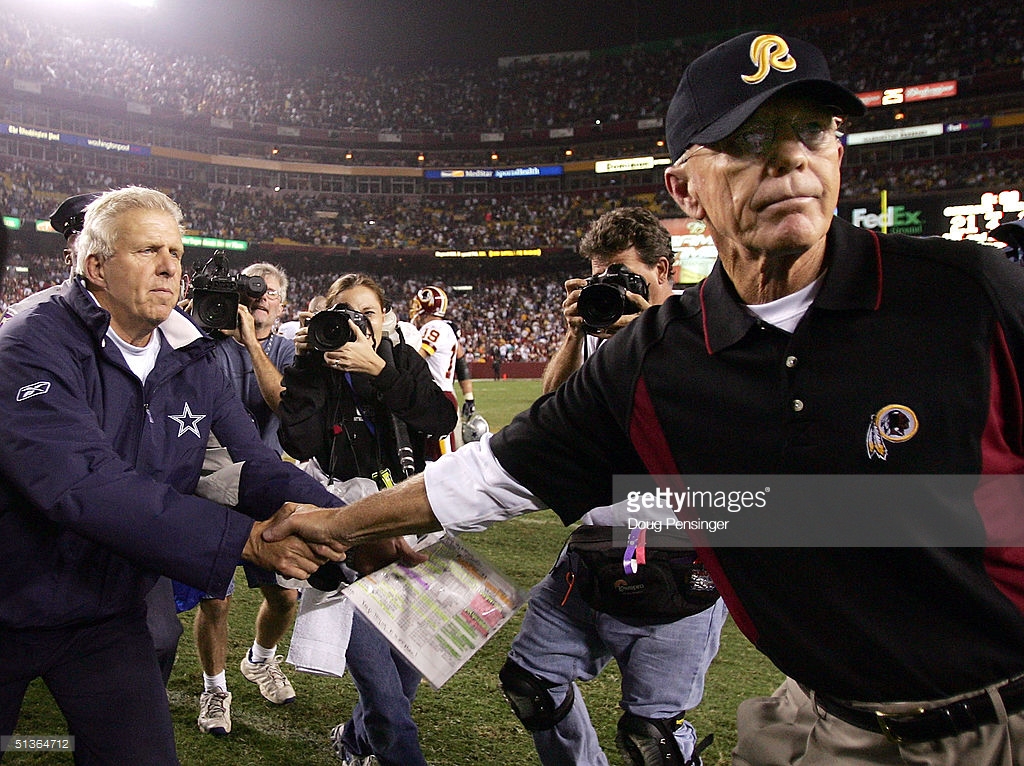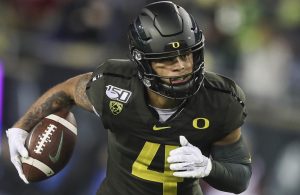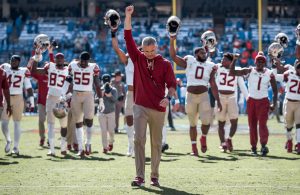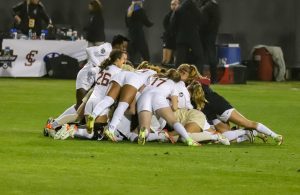- Sunday Seminole Summary: FSU Football Adds Pair of WR Transfers
- Sunday Seminole Summary: FSU Football Exits ESD With Top-15 Class
- Sunday Seminole Summary: FSU Soccer Tops BYU for Third National Championship
- Sunday Seminole Summary: FSU Soccer Advances to National Championship Match
- Seminole Sunday Summary: FSU Soccer Heads Back to College Cup
- Seminole Sunday Summary: FSU Soccer Reaches Sweet 16; Football Tops Boston College
- Seminole Sunday Summary: FSU Soccer Wins ACC, Advances to Second Round of NCAA Tournament; FSU Football Rallies Past Miami
- Seminole Sunday Summary: FSU Soccer Tops Wake on OT to Advance to ACC Final
- Seminole Sunday Summary: FSU Football Crushes UMass for Third Straight Win
- Seminole Sunday Summary: FSU Soccer Stays Perfect with Pair of Wins
The Five Most Accomplished Former FSU Assistants
- By Clint Eiland
- Updated: March 1, 2018
 Doug Pensinger/Getty Images
Doug Pensinger/Getty ImagesFormer Florida State assistant Chuck Amato recently announced his retirement after more than 40 years of coaching college football.
Amato made his name in Tallahassee starting in 1982, when he joined Bobby Bowden’s staff as the defensive line coach. Over the next 18 years, Amato was a key part in making Florida State one of the most dominant programs on the national landscape. He played various roles under Bowden, including assistant head coach and linebackers coach.
Amato then used his success to get hired by N.C. State as head coach in 2000. While his tenure there was relatively average, Amato was yet another former Florida State assistant who greatly benefited from his time with the Seminoles.
After almost 40 years of college football relevance, plenty of impressive (and surprising) names have been linked to Florida State football. Amato’s retirement got us thinking and researching: who were the best assistants to come through the program?
As a slight asterisk to the list, we are only considering assistants who did not assume a larger position at Florida State once they left. It seems like an odd rule, but consider that Bobby Bowden and Jimbo Fisher would both qualify.
Much of this piece was made possible due to the great archives over at NoleFan.org. Give them a click when you have the chance, since they have the most complete historical records of Florida State athletics on the internet.
Bill Parcells
That Bill Parcells? Yep, the 2-time Super Bowl champion and 1990s All-Decade selection was once the linebackers coach for the Seminoles. He was hired by then head coach Bill Peterson in 1970, and stayed until 1972 under Larry Jones. Florida State had a 22-12 overall record while Parcells was there. It’s not clear how much of the defensive success could be attributed to him, but Parcells was still a part of three decent seasons.
It took him seven more years in the college ranks before he made the leap to the NFL. Parcells would go on to be one of the icons of the era, leading teams like the New York Giants, New England Patriots, New York Jets, and Dallas Cowboys to the playoffs. “The Big Tuna” spent 19 years in the league and finished with an overall record of 172-130-1. He also captured three conference championships in addition to his pair of Super Bowl rings.
Check out his team photo here.
Don James
Back when the Florida State football program was barely a decade old, new head coach Perry Moss took a chance on a high school coach named Don James. James came to Tallahassee as a defensive backs coach in 1959 — a position he would hold until 1962 when he got promoted to defensive coordinator under Bill Peterson. James was so impressive that in 1966, bigger programs came calling and he accepted the same coordinator job at Michigan. His first head coaching job came at Kent State from 1971-74, where he happened to teach some guy named Nick Saban.
But James didn’t reach the mountaintop until he was hired by the Washington Huskies in 1975. Over the next 18 years, James brought Washington the most successful era the program had ever seen. That includes six conference titles, seven major bowl appearances, over 150 wins, and a national championship in 1991. He ended his tenure as the greatest coach in Washington history, and was eventually inducted into the College Football Hall of Fame in 1997.
Sure, he may have inadvertently unleashed Nick Saban onto the college football world. But how can you get mad at this smile?
Joe Gibbs
No one can deny that Bill Peterson had quite the knack for finding coaching talent. Another one of his success stories is the NFL and NASCAR extraordinaire Joe Gibbs, who held the title of offensive line coach for the Seminoles back in 1967 and 1968. Two years might not reflect his full abilities as a coach, but it should be noted that three Florida State lineman were drafted in that time span.
Gibbs then held a variety of offensive positions at the college level before getting hired as the running backs coach of the St. Louis Cardinals. His next two stops were in Tampa Bay and San Diego as an offensive coordinator, where he came to be regarded as an up-and-comer in the coaching ranks.
The Washington Redskins took a chance on him in 1981, and 11 years later, he had brought them three Super Bowls and eight playoff appearances. While his second stint with the team in the 2000s didn’t go as planned, Gibbs is fondly remembered as an offensive pioneer and excellent manager of talent.
How much did Gibbs learn at Florida State? Take it from him:
In a December edition of The Spokesman Review in 1992, Gibbs credited Peterson for instilling hard work in him as an excerpt reads:
“ (Joe) Gibbs learned hard work from Peterson at Florida State. Peterson was tireless and demanded that his staff work from the same clock. ‘Peterson had a young staff and he would keep us there for hours,’ Gibbs said. ‘In the off-season he would have reams and reams of films for us to go through. His whole thought was football. He never stopped. It was the same with the players. He worked them so hard, they were productive.’â€
Mark Richt
The younger fans won’t immediately recognize too many names on this list, with Richt being the obvious exception. The current head coach of the rival Miami Hurricanes was well known while in Tallahassee, since he was the quarterbacks coach and later offensive coordinator during the dynasty of the 1990s. That includes guys like Heisman Trophy winners Charlie Ward and Chris Weinke being under his tutelage.

FSU head coach Jimbo Fisher and Miami’s Mark Richt after the game at midfield at Doak Campbell Stadium on Bobby Bowden Field on Oct.7, 2017 in Tallahassee, Florida. Miami defeated Florida State 24-20. (Photo by Don Juan Moore/Getty Images)
While he’s never won the national championship as a head coach, Richt’s career is accomplished by any measurement. He still maintains a .738 winning percentage and led the Georgia Bulldogs to nine seasons with 10 or more wins. In his first two years at Miami, he brought the Hurricanes back to national relevance and immediately raised the talent level.
Richt’s weaknesses and shortcomings don’t detract from his overall career to this point. By and large, he is still one of the best assistant coaches to ever be a part of Florida State’s history.
Skip Holtz
This is slightly cheating, since Holtz was just a grad assistant at Florida State from 1987-88, but we never specified that they had to be in a coaching position.
Skip Holtz’s career to this point has been an oddity, mainly because there doesn’t seem to be a clear progression or even regression with his abilities. Holtz’s rise in the coaching world was exceptionally fast, since he went from a grad assistant in 1987 to the Notre Dame offensive coordinator in 1992. His father Lou Holtz being the head coach might have had something to do with that.
Still, it’s not like Holtz is a bad coach by any stretch. He’s spent a combined 18 years at Connecticut, East Carolina, South Florida and currently Louisiana Tech. The only program he left in comparatively worse shape was USF, where his lack of recruiting success and generally bad hires meant he got ran out of town after three years.
Other than that he’s enjoyed a respectable career. That includes nine bowl games and a 126-99 overall record. He won a pair of Conference USA titles at East Carolina and has claimed two division crowns at Louisiana Tech.
Honorable Mention
Dan Henning
The biggest reason Henning doesn’t make the main list is because of his dismal head coaching record. His time at Boston College was average at best, and his two chances in the NFL in Atlanta and San Diego resulted in a .344 winning percentage. His accomplishments as an offensive coordinator are still notable however: he won two Super Bowls with Joe Gibbs and the Washington Redskins. Henning was an assistant at Florida State from 1968-70 and again in 1974.
Kirby Smart
The next two coaches make the honorable mentions list because it’s still far too early in their careers to draw many conclusions. The first is current Georgia head coach Kirby Smart, who worked as a grad assistant from 2002-03. His stint as Alabama defensive coordinator and sudden revival of Georgia would seem to indicate that Smart will be near the top of the college football world for quite some time.
Mark Stoops
Finding success at Kentucky — at least on the gridiron — is no easy task, but Mark Stoops seems to be doing a good job at it. Stoops used his performance as defensive coordinator for the Seminoles from 2010-12 to leap into a head coaching role with the Wildcats in 2013. His team has now made back-to-back bowl games for the first time since 2009 and 2010. How long Stoops stays at Kentucky remains unknown, and a bigger program might want to take a chance on him if he can continue his recent success.




You must be logged in to post a comment Login